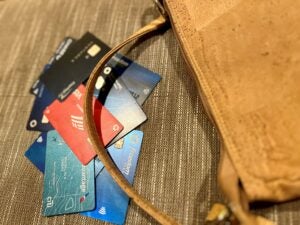My card issuer charged me for ‘card present’ transaction fraud

Key takeaways
- Card present (CP) fraud happens even with chip-enabled credit cards.
- Skimming and shimming are ways thieves steal personal information.
- File a complaint with your card issuer or agencies like the CFPB, FTC or FBI if you’re the victim of card present fraud.
The use of real-time payments has been a welcome addition to the financial industry because of how quickly transactions can be completed. But as with many things, there are downsides, such as bringing vulnerabilities to the financial system that criminals can use to cause chaos for consumers.
One way card present (CP) fraud happens is when thieves make a counterfeit copy of your card. Even though chip technology offers more robust protection for card transactions than magnetic swipes, it’s not infallible. Fraudsters are always looking for ways to tap into your card.
The U.S. migration to EMV chip-card technology was intended to lower card-present fraud, especially counterfeit fraud, according to a 2025 report. Because counterfeit and lost-or-stolen fraud account for more than 80 percent of card-present fraud for U.S. debit cards, EMV chip-card technology could also mitigate overall card-present fraud.
Although the card-present fraud rate of non-prepaid debit cards has been trending down for single-message networks since EMV migration, the rate has been trending up for dual-message networks in the United States, says the report. We’ll take a look at how CP fraud happens and how you can protect yourself from it.
What is a card present transaction?
A card-present transaction is what you think it is — it’s when you swipe, dip or tap a physical credit or debit card at an ATM or a point of sale (POS) terminal or card reader. The cardholder has control of their card, allowing a business to complete transactions after capturing a PIN or signature.
The benefits of a card present transaction include:
- Better security, since a cardholder’s identity can be verified, greatly decreasing fraudulent transactions.
- Security costs are lower, because card present transactions come with lower processing fees, saving businesses money.
- Transactions are done instantly, which means cardholders and businesses have a better payment experience.
Card present vs. card not present explained
Card present transactions are done in-person with a merchant, such as at a supermarket or retail store. A card-not-present (CNP) transaction is anything that isn’t done at a POS or card reader. This includes online, phone or mail order purchases. In these cases, you don’t give businesses a physical card. Instead, the business relies on the customer to share their card number, expiration date and CVV code.
CNP transactions are inherently more risky because you’re sharing your card information in order to process your payment. Sharing that information makes it easier for bad actors to take it and use it for their own purposes, leading to fraud.
How does card present fraud happen?
While chip-enabled cards provide an additional layer of safety compared to magnetic stripe cards, the technology is not immune from being compromised. Chip cards change your information in a dynamic manner for each transaction, so it’s difficult for fraudsters to capture your card details. However, fraudsters also are constantly developing new techniques to tap into credit cards.
It is possible for criminals to make counterfeit copies of real cards and then use them at retail outlets. If an error message prevents them from successfully completing the deal, they could ask the retailer to manually key card information into the terminal to complete the transaction. According to Mastercard, if a transaction is completed manually, that is not adequate proof to establish card presence in case of a transaction disputed as fraud.
Savvy retailers know to ask for additional identification from customers in these cases and to be watchful for fraud. That’s because retailers will be held responsible for fraud associated with such transactions.
Swiping a credit card makes it more amenable to fraud. Gas stations, especially, have been notorious for credit card skimming scams that capture card details (which can be used to commit fraud) on their card swipe transactions.
Thieves can also capture information from chip-enabled cards via shimming. A shim is a thin reader that thieves can insert into a card reader slot at a retailer or ATM. The shim has a microchip and flash storage that can capture and save information from a chip card.
Unlike the one-time transaction token generated by chip cards, information captured by a shim contains the details required to authenticate and process future transactions. Crooks can then take the shim and create forged magnetic stripe cards that use your card information. These fraudulent cards don’t arouse suspicion chip cards also typically contain a magnetic stripe as backup.
What to do if your card dispute is denied
If you believe you’re the victim of card present fraud, notify your card issuer immediately. It will investigate the matter and decide whether to reimburse you for the fraud or deny your claim. In any event, you should get a replacement card as soon as you notify the issuer to prevent any future fraud.
Steps to take
Here’s what steps you need to take if your card present fraud claim is denied:
- Get an explanation from the bank on why your claim was denied.
- Share any information — receipts, police reports and where you shopped — with the bank.
- File a complaint with the bank’s regulator, along with the Consumer Financial Protection Bureau or the Federal Trade Commission‘s IdentityTheft.gov.
- If the amount involved is large enough, you may want to consider pursuing a case with the Federal Bureau of Investigation.
The bottom line
Chip-enabled cards reduce chances of card present and card not present fraud, but it hasn’t been eliminated. You must be vigilant when it comes to protecting your credit cards — and your credit report. It only takes one stolen credit card to cause financial chaos. Check your credit report regularly so you can catch problems before they escalate.
Why we ask for feedback Your feedback helps us improve our content and services. It takes less than a minute to complete.
Your responses are anonymous and will only be used for improving our website.






